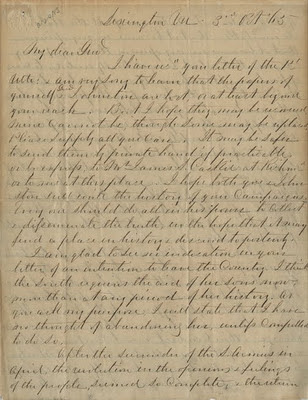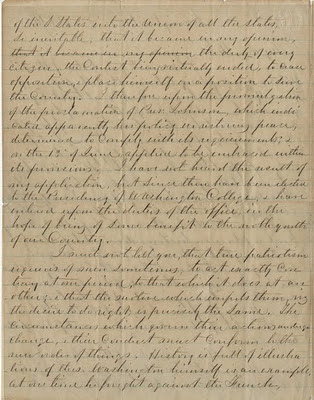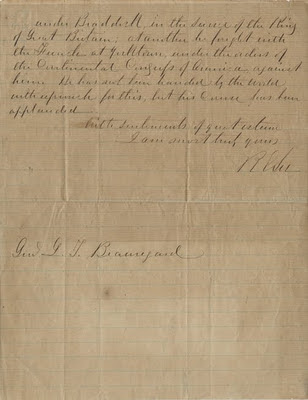This is the fourth in a series of posts that will explore the Rosenbach’s newest initiative, Families Affected by Wartime. This ground-breaking initiative will serve the military community, a population largely ignored by museums. The Rosenbach houses an exceptional collection of wartime letters and documents which speak to the personal experience of war and the challenges faced by service men and women and their families. The project aims to connect families from the past with those from the present, demonstrating the relevance of historical documents to our contemporary wartime experience.
Over the next few months, project advisers, as well as Rosenbach staff and trustees, will be sharing their experiences with the Families Affected by Wartime project here on the Rosenblog.
Finding Their Own Peace: Katie Samson, Families Affected by Wartime Project CoordinatorCurrently, there are 2 million veterans eligible for the benefits of the Post 9/11 GI Bill. That number will continue to increase; 45,000 soldiers are returning from Iraq this year alone. On the local level, Temple University has 750 veterans enrolled this year compared to 200 student veterans last year. Beginning this spring, as part of the Families Affected by War initiative, the Rosenbach will be launching a program and companion exhibition that will aim to serve the growing number of student veterans in our area and tell their story.
Initially, I thought it might be challenging to attract student veterans to a museum-based program. Many veterans hold down full-time jobs, they have long commutes to campus, they are parents, and generally speaking, lead very full lives. But the minute I connected with a couple of local student veterans and told them about the Rosenbach, they leaned into the conversation. “Where and when can I sign up for the workshop?” said one Iraq veteran I met with at a Veterans Lounge. The idea of a “safe space” in the Museum- to meet regularly, engage with the collection in a personal way was interesting to them. They were intrigued with the idea of an exhibition which would serve to tell their story and the stories of veterans from the past.
I also connected with Lawrence Davidson, the Student Veteran Coordinator at West Chester University. Mr. Davidson is an OIF veteran with an undergraduate degree in history, who is currently pursuing a Masters degree in Counseling. Lawrence was particularly drawn to the concept of veterans engaging with the Rosenbach’s collection of historic wartime documents and letters, exploring the American veteran experience and using this body of knowledge to create something for veterans to share with each other and the public. He emailed me this response: “I started my undergrad as a History Education major. As I began to read about war on a collegiate level, I felt a connection to the women and men from previous conflicts. This connection has created a passion to understand men and women at war and when they come home trying to find their own peace.”
In response to Lawrence’s comments about soldiers finding peace, I began thinking of items in the collection which express similar sentiments. I found myself revisiting a post war letter written by Robert E. Lee letter to P.G.T Beauregard from October 3, 1865. The war was over and Lee was struggling to find a place for himself in society. At the time that the letter was written, he had just been selected as the president of Washington College. He writes to Beauregard about this role and the fact that he hoped to be “of some benefit to the noble Youth of our Country.”
The student veterans we aim to connect with have also chosen an academic path. Much like Lee focused his efforts on the future of the country and its Youth, the men and women who served in Iraq and Afghanistan are motivated towards a future of peace both external and internal.
I look forward to the opportunity to bring student veterans into a discussion about this letter and other examples from the collection that speak to the personal experience of war.

 Robert E. Lee , autograph letter signed to G.T. Beauregard, Lexington, Va., 3 October 1865. AMs 540/28 3rd Oct 65 My dear Gen’l, I have rec[eive]’d as your letter of the 1st Ulto: and am very sorry to learn that the papers of yourself and Johnston are lost, or at least beyond your reach. But I hope they may be recovered, mine cannot be, though some may be replaced. Please supply all you can. It may be safer to send them by private hands if practicable or by express to Mr. James Caskil at Richmond or to me at this place. I hope both you and Johnston will write the history of your campaigns. Every one should do all in his power to collect and disseminate the truth, in the hope that it may find a place in history and descend to posterity. I am glad to see no indication in your letter of an intention to leave the country. I think the South requires the aid of her sons now more than at any period of her history. As you ask my purpose I will state that I have no thought of abandoning her, unless compelled to do so. After the surrender of the S. Armies in April, the revolution in the opinions and feelings of the people seemed so complete and the return of the S. States into the Union of all the States so inevitable; that it became in my opinion,
Robert E. Lee , autograph letter signed to G.T. Beauregard, Lexington, Va., 3 October 1865. AMs 540/28 3rd Oct 65 My dear Gen’l, I have rec[eive]’d as your letter of the 1st Ulto: and am very sorry to learn that the papers of yourself and Johnston are lost, or at least beyond your reach. But I hope they may be recovered, mine cannot be, though some may be replaced. Please supply all you can. It may be safer to send them by private hands if practicable or by express to Mr. James Caskil at Richmond or to me at this place. I hope both you and Johnston will write the history of your campaigns. Every one should do all in his power to collect and disseminate the truth, in the hope that it may find a place in history and descend to posterity. I am glad to see no indication in your letter of an intention to leave the country. I think the South requires the aid of her sons now more than at any period of her history. As you ask my purpose I will state that I have no thought of abandoning her, unless compelled to do so. After the surrender of the S. Armies in April, the revolution in the opinions and feelings of the people seemed so complete and the return of the S. States into the Union of all the States so inevitable; that it became in my opinion, that it became in my opinion the duty of every citizen, the Contest being virtually ended, to cease opposition, and place himself in a position to serve the Country. I therefore upon the promulgation of the proclamation of Pres. Johnson, which indicated apparently his policy in restoring peace, determined to comply with its requirements; and on the 13th of June, applied to be embraced within its provisions. I have not heard the result of my application, but since then have been elected to the Presidency of Washington College, and have entered upon the duties of the office in the hope of being of some benefit to the noble Youth of our Country. I need not tell you, that true patriotism requires of men sometimes, to act exactly contrary at one period, to that which it does at another; and that the motive which impels them in the desire to do right, is precisely the same. The circumstances which govern their actions undergo change, and their Conduct must Conform to the new order of things. History is full of illustrations of this. Washington himself is an example, at one time he fought against the French, under Braddock, in the service of the King of Great Britain; at another he fought with the French at Yorktown, under the orders of the Continental Congress of America, against him. He has not been handled by the world with reproach for this, but his course has been applauded. With sentiments of great esteem, I am most truly yours, R. E. Lee
Here is the link to the Washington Post article: http://www.washingtonpost.com/national/health-science/veterans-find-that-their-transition-from-combat-to-college-can-be-difficult/2011/10/20/gIQAugW54N_story.html?sub=AR
